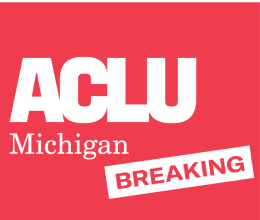
DETROIT - Attorneys for Flint schoolchildren have reached a historic agreement with the Michigan Department of Education (MDE), Genesee Intermediate School District (GISD) and Flint Community Schools (FCS) to establish an unprecedented program to provide universal screening, and in-depth assessments when necessary, to all Flint children impacted by the Flint water crisis.
The program will leverage the Flint Registry, a population-wide screening platform, and expanded assessment services by the Genesee Health System/Hurley Children’s Hospital Neurodevelopmental Center of Excellence (NCE). The program will be organized and operated under the leadership of Dr. Mona Hanna-Attisha, Director of the Michigan State University-Hurley Children’s Hospital Pediatric Public Health Initiative, and will begin at the start of the 2018-19 school year.
“The children and families of Flint have lived with exposure to lead in their water and with schools unequipped to help students whose learning may be affected by this dangerous neurotoxin,” said Greg Little, Chief Trial Counsel at Education Law Center (ELC). “The program set up in the agreement announced today is a major milestone on the road to addressing the needs of children affected by the Flint water crisis.”
The settlement agreement is a major step in DR, et al. v. MDE, et al., a class action lawsuit filed on behalf of Flint children asserting violations of federal and state special education laws. The settlement will be final after an April 12 court hearing in Detroit, subject to court approval.
The lawsuit challenges systemic deficiencies in Flint’s special education program, including failures to find and serve children with special needs and to address the impact of the water crisis, which potentially put thousands of children at risk of developing a disability or worsening an existing disability. The settlement addresses a major aspect of the special education failures in the Flint schools: the need to identify all students with disabilities and properly evaluate them.
The agreement has several key elements:
1. The state of Michigan will provide more than $4 million to get the program up and running by September 2018. Families of Flint children exposed to elevated lead levels in the Flint drinking water can enroll their children in the Registry, complete a screening, and have their children referred for further assessment by the NCE. The battery of available assessments will include neuropsychological testing, which is important for evaluating the effects of lead on cognitive development, memory and learning.
2. The state, city and school district will provide staff to facilitate and maximize participation in the program and collaboration between the program and the schools.
3. Training and professional development will be provided for administrators, teachers and staff on the availability of the program and how to recognize children potentially harmed by lead who may need to be referred for assessments.
Importantly, results of the assessments will be sent to the schools to be used in the process of evaluating students for special education services.
“The settlement is a critical first step in creating a system to identify the needs of the children of Flint,” said Kristin Totten, ACLU of Michigan Education Attorney. “However, the heart of this lawsuit remains, which is ensuring kids with disabilities receive the education guaranteed them by law. As we move forward, we are fully committed to protecting those rights.”
“This is a groundbreaking program, using the most advanced testing available, that represents the first step in an unprecedented solution to an unprecedented crisis,” said Lindsay Heck, an attorney at White & Case. “The partnership created between the medical profession and the schools recognizes that education is the antidote to the crisis that Flint children have endured. In the next phase of the lawsuit we will work to ensure that FCS schools have the resources to provide the children of Flint with the educational opportunities they deserve and to which they are entitled under the law.”
The agreement is a partial settlement of the lawsuit. The attorneys for the Flint parents and children will continue to pursue additional claims, including the provision of appropriate special education services and proper student discipline procedures.
The legal team representing the students pro bono includes attorneys from the ACLU of Michigan, Education Law Center, and global law firm White & Case LLP. The team is headed by ELC Chief Trial Counsel, Greg Little.

